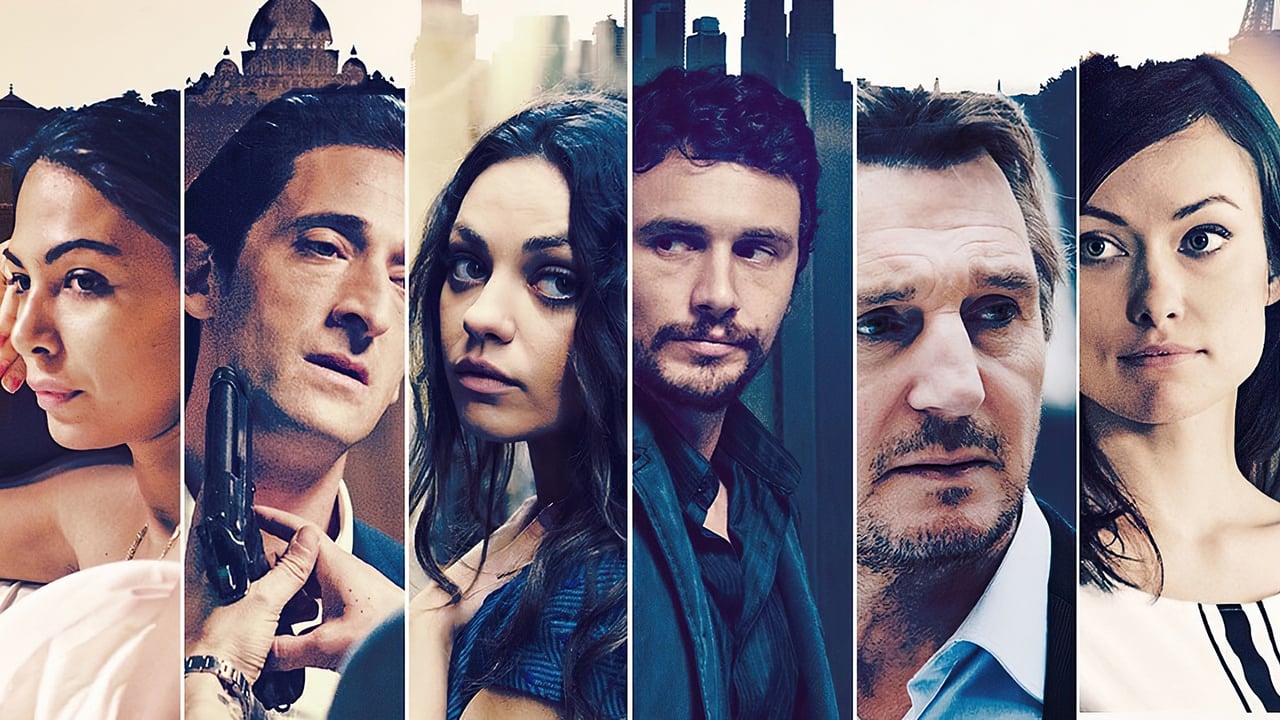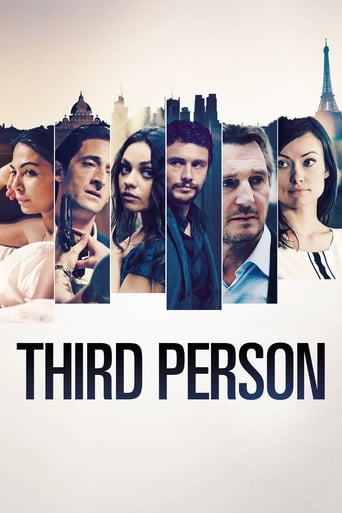

not as good as all the hype
... View MoreA lot of fun.
... View MoreThe best films of this genre always show a path and provide a takeaway for being a better person.
... View MoreA clunky actioner with a handful of cool moments.
... View MoreNO SPOILER the amazing series of event of the three stories of those people who have complicated relationships between ending it forever or abandoning the partner of the relationship , always with a victim in between , victim in the shape of child ... all these characters will end in a strange way by the Michael ( Liam Neeson ) which play the leading role as a novel writer . the movie sends a messages through the scenario or the actors and the brilliant director , play a role to show a social problem
... View MoreThis movie had Paul Haggis' fingerprints all over places but not in the good ways. Paul just extended or limited his creativity around his signature paralleling various story lines then weaving into a monstrosity of who knew what. His Oscar winning film Crash by far is his best of this type of movies as a director. He is a better screen writer than director in my opinion.His talent was the reason to draw those A-list actors and actresses to this movie. However, he lost the focus of the main topic which I am not sure it's about love any more. He applied coincidences way too often to make the whole film congregated naturally. I wish he would not have tried so hard. And the part of revealing Olivia Wilde's character's incest relationship with her father was probably the most appalling and over the top in the entire story. I do not object to use hard subjects in films if only if they would serve the right purpose. This one was out of place except serving as a shocking element. Anyway, I wish to see Haggis' films other than this type in the future. I hope he could extend his writing skill to his directing field.
... View MoreI loved the plot and also the actings, and I truly don't understand the low reviews. I mean, of course it is not an easy film to watch, sometimes it fails to keep your attentions because it does develop slowly and most parts you don't get it right away... But it is a great movie, intelligent and with amazing actings. I confess I didn't get all the points right away and had to do a little research afterwards, but when I got it all, the story became even more beautiful. I gathered some of those points I found important to understand to be able to evaluate the movie properly, so if you don't want spoilers DON'T READ BELOW HERE.*******SPOILER ALERT*******1. The writer was NOT in Paris writing his book; he was in Rome. Maybe some people missed this detail (as I did), but when his wife calls him, in the final scene, she asks him, "How's Rome?". And also you can clearly see he's sitting in a café in an Italian city. 2. Everything that happens between the starting scene, when he hears his son's voice on the hotel room "Watch me," and the same voice "Watch me" in the final scene of the film, is part of his book -- including the story about the writer in Paris with his lover. Probably his mistress name was not Anna, and we can notice that she is fictional by how idealized (at least partially) she is: young, pretty, and with sense of humour, and perfect.* Remember that he always writes in Third Person (not by chance, the name of the movie).** Perhaps Paris did happen, but not during that time space we are watching the movie. Maybe months ago... Note that his wife calls him twice and both times she asks: "Is she there?", and he always answers "No" -- in the final scene, he still adds "She left me two months ago".*** Note the references to white in each story: Anna's dress in the final scene is white, the glass of milk the child gives his father is white, and the car in which the American drives away with the gypsy lady is also white. "White the color of trust. And the color of the lies he tells himself" -- says the end of the book.3. As he atones for his sins through the characters from his book, we know what really happened going from there:In real life, he loses his lover when she learns that it was because of her call that his son drowned; in Paris' story, his mistress ("the only true love of his life") comes back to him.In real life, he loses his son; in Italy's story, the American saves the gypsy lady's daughter (note that inside the car they look back and smile, and as the camera goes away you can see the silhouette of a child in the back seat of the white car).In real life, he never wins back the trust of his ex-wife; in the story with Mila Kunis, James Franco trusts her again after the incident in the elevator. * Also note the references to bad fathers in each story:In Italy, the American also lost his son.In New York, the boy's father is absent and always working, and they do not have a close relationship.In Paris, the father used to abuse of Anna, probably since she was a child.
... View MoreThird Person (2014) is written and directed by Paul Haggis, the award-winning filmmaker who, in 2006, became the first screenwriter to write two Best Film Oscar winning films back-to-back, Million Dollar Baby (2004) directed by Clint Eastwood, and Crash (2005) which he directed himself. Liam Neeson plays a 50-ish Pulitzer-Prize winning writer, Michael, who has left his wife (Kim Basinger) and is holed up in an elegant Paris hotel room, attempting the new novel that will resurrect his failing career. Constantly writing and editing, Michael struggles with his book. As we watch him write, some of his conversations appear verbatim on his computer. Here we may be wondering whether we are viewing fragments of his novel come alive or whether his writing is more nonfiction than one would think. In the end, the viewers get a glance at everything taken place. The ending is well done as it can interpreted in several different ways.
... View More